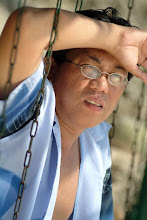 Our Own Enemy
Our Own EnemyLike a cat giving birth to a puppy, something is out of whack when all that caterwauling about caring for the mother tongue gets the speakers wagging their tails in English instead.
Pastilan, the Bisdak spirit is willing but the tongue is weak. Or so those who stood up to speak at the symposium (a component of “Dalit Bisaya: A Celebration of Cebuano Culture” at the University of San Carlos) waxed awkward and apologetic for their fluency in “speaking dollars,” the currency of our educational system.
Victim of circumstance, thus one reactor explained her plight as she recalled and reminded her listeners what every school kid has learned all along: The vernacular is verboten in the classroom, and it means having to say you’re sorry after getting fined for speaking it.
And who can blame us, dear reader, if you opt to be an English patient as you recuperate in the act of reading me?
Talking on “The Future of Visayan,” Dr. Francisco Nemenzo (former president of the University of the Philippines) has an uphill way to go as he called on Cebuanos “to help promote, dignify and intellectualize the Cebuano language and to revive interest in the Cebuano culture.”
Licking ash, however, is not an option despite the givens of globalization and the politics in the policy of our national language. Swallow it all, we can. But that doesn’t have to entail vomiting out and casting aside what’s intrinsically ours.
True, aside from the obligation to reconcile ourselves with our historical and geopolitical circumstances, it behooves upon every Cebuano worth his birthright to be rabid with the responsibility to rage. Yes, against the dying of our umbilical words without which we Cebuanos might risk an orphan’s identity or consign to oblivion a vital aspect of ourselves “in the family of things,” as one poet puts it.
 Tongue in cheek with our colonized consciousness, we have so much humble pie to digest. “The prevalence of colonial mentality in the age of globalization is the biggest threat to the survival of Visayan,” Nemenzo sighed. “If the Visayans themselves prefer to speak English to each other and use Visayan only for trivial chatter, our language is bound to die.”
Tongue in cheek with our colonized consciousness, we have so much humble pie to digest. “The prevalence of colonial mentality in the age of globalization is the biggest threat to the survival of Visayan,” Nemenzo sighed. “If the Visayans themselves prefer to speak English to each other and use Visayan only for trivial chatter, our language is bound to die.” Where does that leave the rest of us licking our lips while gloating over the ascendancy of the English language? “The world is changing so fast that English, perhaps the most worldly of languages, is struggling to keep up,” warns David Graddol, a British linguist and author of 'The Future of English?'
Indeed, it’s foolhardy to be complacent if we reckon how the erstwhile dominance of Greek and Latin did not spare the “lingua franca” from passing away.
No matter how convenient, English cannot replace other languages in the world. More than a communicative tool, language carries the signature of a particular race or culture. We may learn to branch out linguistically as citizens of the world, but no way can we uproot ourselves by displacing our language or facilitating its erasure. Of betrayal, Eugene Gloria’s poem In Language articulates it exactly: “It’s in the act/ of cleansing that we kill the spirit— ourselves; every culture’s worst enemy/ is its own people.”

























































3 comments:
Mother tongue shouldn't be abandoned like a withering granmother in the street of nowhere. Mother tongue is a
baby that should be caressed with a gentle angelic hands and should be taken care of, more than our pet dog named stupid English.
It goes without saying that we ought to nurture and to master as well our mother tongue.
Don't get me wrong, Kevin, but I don't think it's wise to suckle our own language while badmouthing English as "stupid." In fairness, English has been fair to me, given its literature and its culture from which I supped and burped. It's not an either/or proposition. The more language we know, the better.
Maayo man nga kahibalo pud ta mo-inenglis,labi na kon wala nato taligam-i ang atong pagka-Bisdak.:)
Post a Comment